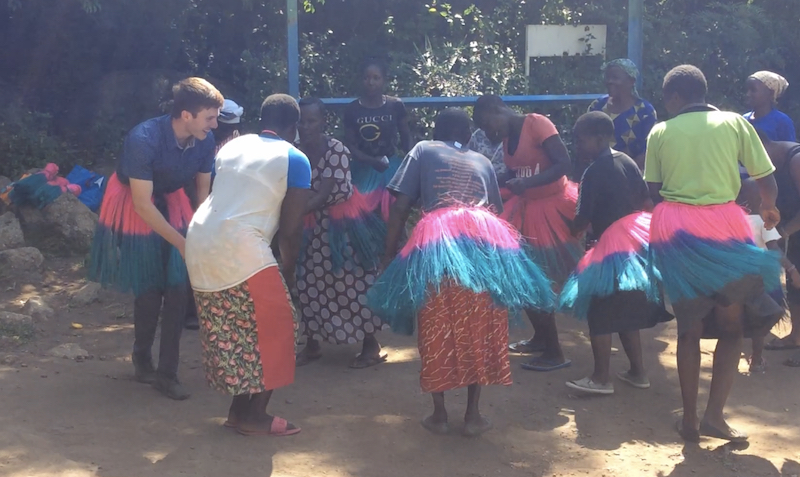Jack Drey ‘24 (biological sciences) was funded through a Kellogg/Kroc Undergraduate Research Grant to travel to Kenya to work on his project, “From Stress to Success: Analyzing the Role of Mentorship & Mental Health Training in Overcoming Barriers to Girls’ Education in Kisumu, Kenya”.
In the past two weeks I have been able to make considerable progress on my research project. Though we had to begin venturing to schools farther away than in the first couple of weeks, I was able to complete 16 more interviews with teachers and principals at various schools, as well as a few with parents who we visited on the way to and from a couple of the schools. Traveling to schools that were farther away gave me more of an opportunity to experience Kenyan public transportation. To several of the schools we boarded vans packed full of people in several rows, which stopped at random to pick people up on the sides of the road, which was definitely a new and interesting experience compared to public transportation in the United States. Throughout the interviews I have begun to pick up on patterns and trends in the answers that I believe could be helpful in addressing my research question. I have also begun the work of transcribing some of the interviews, which, though time consuming, has been a great opportunity to review the answers and content that I received in these interviews. I think I am in a very good spot for wrapping up my field research in the last two weeks of my time here, as I have already made plans to meet with and interview at least six of the mentors who help the organization during the mentorship program over the final two weeks, as well as the founder and director of the program. Additionally, I hope to speak to a couple more parents and continue in the beginning stages of analysis. This will give me a good amount of information from teachers, mentors, and parents which will allow me to address my research question.
In addition to completing my research interviews, I have also been able to continue experiencing Kenyan life, as well as learning some about Kenyan history and politics. Dr. Juliana, the director of the Rusalia Resource Foundation, invited me to a dinner out at her home in her village where I was able to meet several other doctors with whom she went to medical school in Kenya. It was very interesting to hear their stories from medical school and about growing up in the area, especially because of my interest in pursuing a career in medicine someday. Linus also took me to stay a night out at his family’s homestead out in his village. I was able to enjoy a large amount of Kenyan tea, and a homemade meal from his mom and sister. I was able to see how families still follow the same layout as in traditional Luo homesteads to decide where wives and children build their houses on the homestead. For example, the house that is centered when entering the homestead is for the first wife, with any other wives alternating on either side of it. Similarly, each son builds a house on either side of the entrance of the homestead, alternating from oldest to youngest.
 During a visit to one of the schools we were also able to visit the former home of Kenya’s first vice president, Jaramogi Oginga Odinga, which now features his mausoleum and a museum dedicated to him. This granted me another opportunity to learn more about the political history of Kenya. Further, another of the schools was close to the former house of Barack Obama’s grandmother, which we were also able to visit. On Saturday, Linus’ church group hosted a celebration for St. Paul at his house. I was invited to join, and while mass was almost completely in Luo, limiting my understanding, it was wonderful to try more Kenyan foods. Linus also showed me how to make ugali, by boiling water and adding in maize flour while stirring. I am looking forward to attempting to make it at home for my family.
During a visit to one of the schools we were also able to visit the former home of Kenya’s first vice president, Jaramogi Oginga Odinga, which now features his mausoleum and a museum dedicated to him. This granted me another opportunity to learn more about the political history of Kenya. Further, another of the schools was close to the former house of Barack Obama’s grandmother, which we were also able to visit. On Saturday, Linus’ church group hosted a celebration for St. Paul at his house. I was invited to join, and while mass was almost completely in Luo, limiting my understanding, it was wonderful to try more Kenyan foods. Linus also showed me how to make ugali, by boiling water and adding in maize flour while stirring. I am looking forward to attempting to make it at home for my family.





